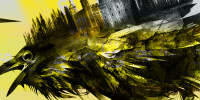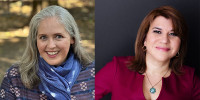
Five top tips for adapting a short story into a novel
scottishbooktrust.com – Saturday June 14, 2025

Former New Writers Awardee and recently published author Alessandra Thom shares her top tips for adapting a short story into a novel.
The step from writing short stories to novels can seem insurmountable. Writing a short story of a few thousand words is vastly different from a novel of tens or hundreds of thousands. If a short story is a drop of water, a novel is the loch it falls into. But if you can write a short story, you can write a novel. All the elements, though different, are there: building suspense, developing character, creating a compelling plot and a vibrant setting, utilising themes and motifs.
I wrote my first novel by taking a short story I’d already written and adapting it. Here are my five top tips to help you do the same.
Read, re-read, then read again
Read your short story from beginning to end, then read it again. If you can, print it out so you don’t fall into editing it. Go over it with a pen, or add comments on your computer, highlighting moments you think are intriguing. These could be moments where it’s evident you’re only seeing one side of a character, or moments where there is a plot door open that your characters don’t walk through, or simply moments that make you feel something.
You’ll learn what kind of novel you want to write by discovering what resonates with you, and what opportunities excite you.

10 Novels Agents Have Seen a Billion Times, and How to Make Yours Stand Out
electricliterature.com – Saturday June 14, 2025

It is not easy to write a book or get published. I’ve been a literary agent for almost 20 years, and I’ve written six books myself, most of which are tucked away in a drawer. As an agent, I receive hundreds of query letters every month, all vying for a spot on my list and a chance to go out to editors to see if they’ll get published, too. It’s daunting to say the least.
The first battle is figuring out what to write. Clearly everything has been done before, no? I see familiar concepts and tired storylines every day. But if there’s nothing new under the sun, how can writers stand out to agents and editors while also giving readers what they want and maybe taking advantage of trends?
There’s so much to say on this topic that I basically wrote a whole book about it. Writing Write Through It: An Insider’s Guide to Publishing and the Creative Life helped me better understand how writers can navigate the weird, opaque, and confusing publishing landscape. There are no shortcuts or sure things, but my bird’s eye view of the industry has given me some insight, starting with what to write.
Way back in 2017, I wrote about the novels literary agents see all the time. No more zombies, I said back then. Now, times have changed! You can write a zombie novel if you want! It’s time for an update. I’m back to tell you about 10 novels that fill agent’s inboxes these days, but also how you can make yours stand out from the crowd. You can write anything you want. The key is to think about the reader, too.

The Horror of a Border: Laura Elliott On Writing the Abject
crimereads.com – Saturday June 14, 2025

It’s perhaps the question every horror writer dreads being asked the most, yet it happens with alarming frequency. Recently, this question was asked by my mum, a woman who, by her own admission, “doesn’t like anything that couldn’t be real”. Nevertheless, a couple of months ago she gamely read an advance copy of my debut horror novel, Awakened, and then called to ask me: why?
It was a question I’d expected, and on that afternoon, phone in hand as I reorganized my kitchen cupboards, my first impulse was to reassure her that my fascination with horror came from a desire to understand the darker impulses of humanity, rather than because I harbored any disturbing proclivities towards violence myself.
However, after I hung up the call, I began to think a little more deeply about why horror has always drawn me in. What is it about this particular genre that keeps on pulling me back?
Certainly, as a disabled woman, on the face of it horror isn’t the easiest genre to find a comfortable home in. It’s a place where disability is often used as a lazy “narrative prosthesis”—or visual shorthand—for moral or social decay. Where women suffer gratuitously, and sometimes sexually, at the hands of monstrous men.

The Rise of Indie Authors: Why Self-Publishing is Booming in 2025
rollingstone.co.uk – Friday June 13, 2025

For decades, the overarching umbrella genre of fiction has continued to dominate the bookish community. While it remains considered the most popular form of literature, how authors produce and publish their work has significantly shifted.
As reader behavior fluctuates and accessibility to technological advancements increases, these systemic changes power a surge in independent fiction publishing.
Out with Gatekeeping, In with Algorithms: A Modern Publishing Economy
The need for traditional fiction publishers and the print market has declined since 2018. Fortunately, this drop did not indicate that consumers were no longer interested in reading books. Instead, seasoned authors ascribe the decline to a rise in self-publishing practices. Self-publishing empowers indie authors to surpass conventional publishers and spread their written works more directly. Although many might assume e-books would hold their ground, the comprehensive electronic book market for legacy publishers has also endured a downturn. That said, the growing prominence of digital audiobooks somewhat counterbalances this slump.
Publishing platforms like Wattpad, Vella, Ream, and Amazon’s Kindle Direct Publishing (KDP) have removed most of the friction associated with regular fiction distribution. KDP, in particular, continues to impact book circulation by leveling publishing. This Amazon-bound platform provides authors with direct reader access, allowing them to expand the exposure of their pieces.

The broken midlist: why it’s harder than ever to be a ‘moderately successful’ author
artshub.co.uk – Tuesday June 10, 2025

Once the heart of the publishing industry, midlist authors now face dwindling advances, fading support, and a market obsessed with viral hits.
In 2025, the publishing industry is increasingly dominated by bestsellers and viral sensations, leaving midlist authors – those who produce consistently solid but not blockbuster titles – struggling to maintain their careers. The traditional model, where publishers nurtured midlist authors with the hope of building them into future stars, is eroding.
The impact on the broader publishing landscape is clear, with countries like Australia experiencing some of the most significant consolidation it has ever seen.
The case of the vanishing midlist author
Historically, midlist authors have formed the backbone of the publishing industry, providing a steady stream of reliable titles that, although not topping bestseller lists, contribute to a publisher’s financial stability. However, recent trends indicate a decline in support for these authors. Publishers are increasingly focusing resources on potential bestsellers, often at the expense of midlist titles. This shift is partly due to the high costs associated with marketing and distribution, which are now being allocated more selectively
The Penguin Random House antitrust trial revealed that only 35% of its books are profitable, with just 4% accounting for the majority of profits, highlighting the industry’s reliance on a few high-performing titles.

On feeling energized by rejection
thecreativeindependent.com – Friday June 6, 2025

Author and literary agent Kate McKean discusses switching between professional hats, trying again and again while knowing that she might fail, and keeping her eyes on her own page.
You wanted to be a writer. Why did you become a literary agent, where you’re dealing with other people’s writing all day?
I have wanted to be a writer since I was 8 years old. And once I got to college, my sister, who was in publishing at the time, was like, “I don’t think you want to be a high school English teacher when you grow up. I think you should get an internship at the university press at your college.” So I did. I got an inside look at how books were made, and I was like, “This is something I can do while I write so that I won’t be a starving artist.” Because I was never going to be a starving artist. I just like eating. I knew that as a literary agent I would have a lot of freedom in my career, and that I eventually could even work for myself. I wouldn’t have to work in New York. I could just do anything I wanted. And that has turned out to be true.
Let’s talk about side hustles and the freedom that has allowed you. In addition to agenting, you have your writing and your newsletter. How do you juggle it all?
However I can. I’ve been an agent for almost 20 years so I can be choosier with the projects I take on because of where I am in my career. I have a lot of clients who are very well-established. I don’t have to hustle quite as much on my agent side, so I have the freedom to do the writing side as I see fit, whether that’s at 6:00 in the morning, or 6:00 in the evening, or 2:00 in the afternoon…
Does your boss have any issues with that? Or are you effectively an independent contractor, and as long as the work gets done, you can do whatever?
I’ve effectively always been an independent contractor, and Howard Morhaim has been my boss and mentor now for almost 20 years, and he’s not over my shoulder checking my work. He would be if there was a problem. But luckily, that hasn’t been the case in many, many years. And as long as my clients are happy and the money is coming in, for me and him and my clients, then it’s fine. We’re very close. It’s a wonderful relationship.

How to Make a Living as a Writer
thewalrus.ca – Tuesday May 20, 2025

Horse stories in the morning, erotica in the afternoon
When people ask what I do for a living, I’m faced with two choices: either I can lie or I can bore them with the truth, which is too complicated to explain succinctly. While those around me have normal, definable jobs—accountant, journalist, engineer—my work requires headings and subheadings to get it across properly: a map of overlapping gigs and contracts.
“What do you do?” It’s a simple question that often gets asked on first dates. No matter how much I pare down my reply, it’s always long winded.
“Well, I’m a freelancer,” I start, “so I have a million little jobs . . .”
The first of my million little jobs is what I call “Horse News.” It works like this: every weekday, I wake up at 6 a.m. and make my way to my desk, stumbling and still half asleep. I flick on an old lamp and wince as my eyes adjust to the light. I turn on my computer and use a piece of software that shows me all of the American horse racing–related news from the past twenty-four hours. It pulls up radio clips, Fox News segments, and articles from publications called BloodHorse or Daily Racing Form—anything that could be relevant to my interests.
I sift through countless story summaries, many of which sound fake. Army Wife defeats Crazy Beautiful Woman in race! Another doping scandal emerges in Northern California! A disgraced-but-very-good trainer is no longer banned from the track! A famous YouTuber has invested millions into a betting app! I compile the important stuff into a newsletter: stories about track renovations, big events, the series of horse laws that were passed, then repealed, then approved again in 2023.

What Happens When a Journalist and a Psychotherapist Write a Mystery Together?
crimereads.com – Thursday May 15, 2025

Kate Hilton, a practicing psychotherapist, and Elizabeth Renzetti, a career journalist, are the authors of the Quill & Packet mystery series. The first book, Bury the Lead, became a bestseller in Canada when it was published in early 2024. On May 1, Widows and Orphans continues the adventures of Cat Conway, a journalist for a cottage-country newspaper, as she investigates the murder of a wellness influencer and dodges attacks by misinformation-sowing locals.
On the eve of publication, the authors sat down for a conversation about their writing collaboration.
KH: It’s so great to be at a point where we’re launching the second book in the Quill & Packet series and writing the third one! It still feels kind of surreal to me.
ER: Especially as the world catches up to our fiction. In an earlier century we might have been burned as witches, because the mystery in Widows and Orphans is so timely: We’ve got the wellness industry, anti-vaccine protests, and a disinformation dumpster fire. As a journalist I’m used to being treated like a witch, though.
KH: I know what you mean. There’s some of that in the therapy room, too. One thing I love about this book is how we’ve captured some of the malign effects of living in an era of massive stress and uncertainty. People want to feel better; they want more control over their lives and more answers. It makes them vulnerable to bad actors selling snake oil – whether that’s in the form of products or “information”.

Do we really need more male novelists?
theguardian.com – Sunday May 4, 2025

There may not be obvious successors to the likes of Martin Amis and Salman Rushdie among today’s hotshot young writers. But is a new publisher dedicated to ‘overlooked’ male voices necessary?
"Where have all the literary blokes gone?" is a question that has popped up in bookish discussions and op-eds from time to time in recent years. Who are this generation’s hotshot young male novelists, the modern incarnations of the Amis/McEwan/Rushdie crew of the 80s?
The question flared again this week as writer Jude Cook launched a new press, Conduit Books, which plans to focus, at least initially, on publishing male authors.
Cook says the publishing landscape has changed “dramatically” over the last 15 years as a reaction to the “toxic male-dominated” scene of the 80s, 90s and 00s. Now, excitement in publishing circles centres on a “new breed of young female authors, spearheaded by Sally Rooney et al”. While this is “only right as a timely corrective”, the side-effect is that male authors are “often overlooked”, their voices deemed problematic.
Are male novelists actually in decline? Some metrics certainly say so: of all the writers to appear on the weekly Sunday Times bestseller lists for fiction hardbacks so far this year, just a third are men.

5 Ways You Can Get Paid To Write Online
forbes.com – Wednesday April 30, 2025

If you have a knack for stringing words together in a way that’s coherent, adds value, and strongly appeals to your target audience, you can make money online. It won’t be easy initially, but as you build up your reputation, proof of your work, and the results you deliver, your writing will pay off more than you’d ever imagine.
Freelance writing has strong appeal in the side hustle and freelance world because it is so easy and inexpensive to start. Getting paid to write online is so ridiculously simple to set up that this appears frequently in write-ups about side hustle ideas and ways to make money online. All you need is your laptop and a stable internet connection, which means you don’t need any investment or capital to begin making profits.
Because there are low barriers to entry for you to making money online with writing, you can literally begin writing online today and start earning within a week, depending on your current audience or following, how well you market yourself, and a range of other factors.
Get the free newsletter | Submit a news item or article | Get Writers' News for your website





